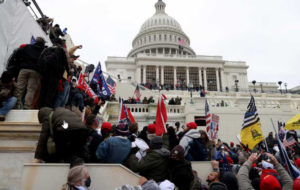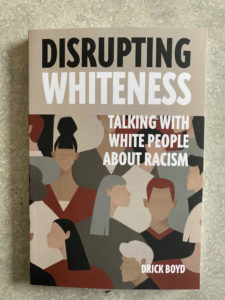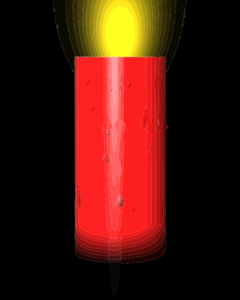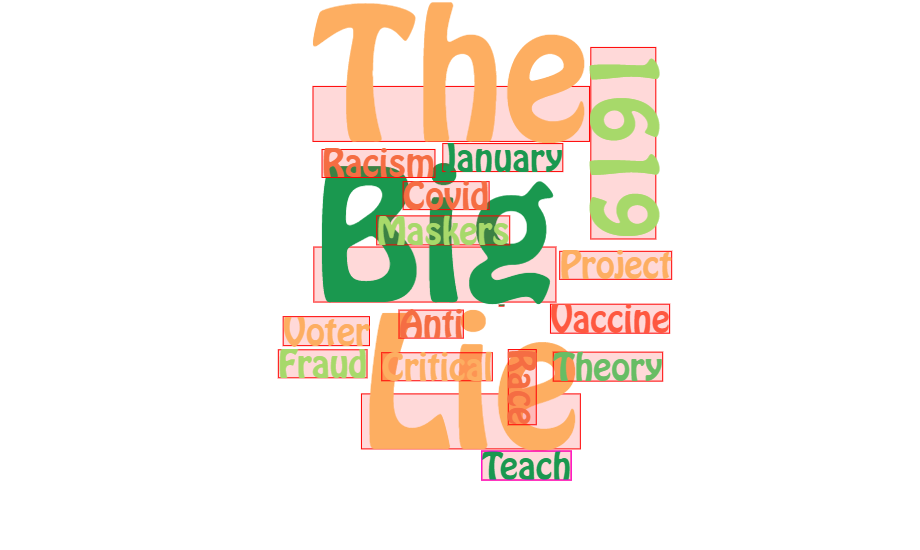When apparent stability disintegrates,
as it must —
God is Change —
People tend to give in to fear and depression,
To need and greed.
When no influence is strong enough to unify people they divide.
They struggle,
One against one,
Group against group,
For survival,
Position,
Power.
They remember old hates and generate new ones,
they create chaos and nurture it.
They kill and kill and kill,
Until they are exhausted and destroyed,
Until they are conquered by outside forces,
Or until one of them becomes a leader most will follow
Or a tyrant most fear.
(Octavia Butler, Parable of the Sower)
“The Big Lie”
About three weeks before my book Disrupting Whiteness was released, an angry horde of Trump supporters attacked and invaded the nation’s Capital where Congress was meeting to certify the election of Joe Biden as president. They attacked because they believed that the election was “stolen” from their favored candidate, Donald Trump. In a Feb 9 blog posting, I related how I reached out to three Trump supporters I knew, all of whom denied that the election had been fair and offered theories about having the election stolen from him. What I did not realize at the time was this was only the first inkling of what has become known as “The Big Lie” being put forth by Trump supporters and long-standing Republican leaders seeking to stay in Trump’s favor.
In that same blog I asked, “Where are the leaders of conscience among Republican Congresspeople,” and only a few — Mitt Romney, Liz Cheney, and Adam Kitzinger — had the courage to acknowledge that the attempted takeover of the Capital was a travesty and that Donald Trump had a hand in it. They have since been ostracized by their own party for saying so. More recently, House Republican leader Kevin McCarthy refused to support a special inquiry into the January 6 invasion, and in twisted logic blamed Nancy Pelosi for the events of January 6. Numerous state legislatures have gone further to pass voting bills making it harder for poor people and People of Color to vote, all in the name of stopping “voter fraud,” which scrupulous studies have found did not to occur in any significant numbers. Many of those same state governments have gone on to ban the teaching of Critical Race Theory, the 1619 Project and basically, anything having to do with the history of racism and genocide in our country. And then in the most bizarre and dangerous actions, governors like Florida’s Ron DeSantis and Texas Governor Greg Abbot, have banned schools and businesses from requiring employees and students to get vaccinated and wear masks. Not surprisingly, Florida is the state with the most new Covid cases, with Texas a close second. And in one of the more bizarre manifestations of the Big Lie, Mike Lindell, better known as the “My Pillow Guy,” has been going around the country claiming he has proof the election was stolen (which he has yet to reveal) and that Trump would resume the presidency before the end of the August (now he has moved it back to New Year’s Day).
that the attempted takeover of the Capital was a travesty and that Donald Trump had a hand in it. They have since been ostracized by their own party for saying so. More recently, House Republican leader Kevin McCarthy refused to support a special inquiry into the January 6 invasion, and in twisted logic blamed Nancy Pelosi for the events of January 6. Numerous state legislatures have gone further to pass voting bills making it harder for poor people and People of Color to vote, all in the name of stopping “voter fraud,” which scrupulous studies have found did not to occur in any significant numbers. Many of those same state governments have gone on to ban the teaching of Critical Race Theory, the 1619 Project and basically, anything having to do with the history of racism and genocide in our country. And then in the most bizarre and dangerous actions, governors like Florida’s Ron DeSantis and Texas Governor Greg Abbot, have banned schools and businesses from requiring employees and students to get vaccinated and wear masks. Not surprisingly, Florida is the state with the most new Covid cases, with Texas a close second. And in one of the more bizarre manifestations of the Big Lie, Mike Lindell, better known as the “My Pillow Guy,” has been going around the country claiming he has proof the election was stolen (which he has yet to reveal) and that Trump would resume the presidency before the end of the August (now he has moved it back to New Year’s Day).
As Octavia Butler describes above, our nation is in a period of disintegration.
What I Did Not Anticipate
When I wrote Disrupting Whiteness, I assumed that white individuals responding negatively to charges of racism, either in their behavior or the system-at-large, would be operating in the same basic realm of reality. Their reactions of denial, guilt, shame, anger, or minimizing racism’s effects, while resisting owning up to our nation’s racism, would be basically dealing with the same set of facts or events. Where we would differ would be in how we interpreted those events. I proposed that we enter into dialogue with those who denied racism and seek to understand the personal stories that led them to think or feel the way they do. I proposed that we engage in ongoing conversation to move beyond one’s “position” to a deeper understanding of each other. In the book I acknowledged that at times individuals might act or speak so overtly racist in their words and actions, that the best we could do is interrupt their hateful attitudes. But I didn’t foresee that the violence, hatred, and mass  denial would be as widespread as they apparently are.
denial would be as widespread as they apparently are.
I also did not anticipate that people, like those pushing and believing the Big Lie, would create a whole set of “alternative facts” with no basis in reality, such that there would be few points of connection from which to start a conversation. When someone says that the election was stolen, even though over 50 court cases and numerous recounts have shown that not to be true, where do you start? When someone insists that on January 6 the invaders were just like a tour group (as asserted by Georgia Congressman Andrew Clyde), where do you start? And when people want to literally whitewash the history taught in public schools, denying the racial disparities that have been shown to repeatedly to exist past and present, where do you start? These are the questions that have hounded me ever since January 6.
One of the things I have come to see, and which many others have noted, is that while each of these issues (January 6, accusations of voter fraud, denying critical race theory, and banning safe protocols for preventing the spread of COVID) are significant issues in and of themselves, they are all connected by the Big Lie. They are part of an organized political effort to divide the country based on fear. And with each new layer of lies, backing out becomes that much more difficult. I remember as a child time when I would tell one lie, which then would require another lie to back it up, and then a third and fourth. Eventually, my story got so convoluted it did not even make sense to me, much less to an outside observer. That is what is happening with the Big Lie.
The Sense of Urgency
Barbara Holmes describes our current state of affairs this way: “The crisis begins without warning, shatters our assumptions about the way the world works, and changes the story and the story of our neighbors. The reality that was so familiar to us is gone suddenly and we don’t know what is happening.” Our current crisis has many dimensions: political, racial, economic, educational, and personal, and while we may interpret and experience the crisis in different ways, we are all experiencing it and it is tearing us apart.
Like many of you, I have been barraged by emails from politicians and activist groups stressing the urgency of this moment. Like me, you probably have also probably have received any number of surveys asking questions seeking very transparent answers, that end with a request for a contribution. The vast majority play on the politics of fear: if the Republicans win this or that, horrible things will happen. What I don’t see is a vision of what this historical moment might mean. Urgency is necessary but an urgency to put forth a vision of what the country can and must be for people of all identities to thrive is missing.
The Call to Slow Down and Reimagine the World
 Reflecting on this moment, Holmes draws on a traditional African wisdom saying: “The times are urgent; let us slow down.” While many might respond: “Slow down! No! We must move, we must act, we must do something, now!” And yet if all our activity is based in the fear of what might be, rather than a vision of what can be, is the call to action worth it? I am not saying activism and political action are not important, but what are they grounded in?
Reflecting on this moment, Holmes draws on a traditional African wisdom saying: “The times are urgent; let us slow down.” While many might respond: “Slow down! No! We must move, we must act, we must do something, now!” And yet if all our activity is based in the fear of what might be, rather than a vision of what can be, is the call to action worth it? I am not saying activism and political action are not important, but what are they grounded in?
The call to slow down has enabled me to articulate what lies beneath my angst and anger at The Big Lie. I frame it this way — How do I promote and embody shalom in the midst of increasing polarization? I don’t have answers at this point but it informs how I think and act toward those caught up in the lie and how I carry myself. In the words of Rainer Marie Rilke, I must “live the question” in the hope I will with others live into the answer.
Shalom, the Hebrew word often translated as “peace’ is really about wholeness, health, dignity, and well-being, not just for some but for all. As Sikh activist and writer Valarie Kaur says: “We need to reimagine the world.” What would a world without white supremacy, without mass incarceration, without runaway capitalism, without violence look like? What would a world, as Dr. King said 58 years ago, where people are “judged by the content of our character and not the color of our skin” look like? What would a world with quality education for all, with quality healthcare accessible to all, where more money was spent in building up communities at home and abroad than policing them with a vast military look like? What if all the money spent on political campaigns actually went to address the issues the candidates say they wanted to address?
To reimagine, we must slow down enough to think beyond the urgency of the moment to envision what Shalom looks like in this moment and the future, a shalom the perpetrators of the Big Lie may in some twisted manner, may also be seeking. In July President Biden compared this historical moment to the tensions that led to the Civil War. Others have made that same comparison. If we want to avoid going down the same road as our forebears did in 1860, we need to stop, pause and reflect on what this moment is calling us to.
Over the next few weeks with the help of Barbara Holmes, Valarie Kaur, and others I will share some of my reflections on this moment, and I invite you to do the same.
Sources Cited
Octavia Butler, Parable of the Sower. Seven Stories Press, 1993.
Barbara Holmes, Crisis Contemplation: Healing the Wounded Village. CAC Publishing, 2021.
Valarie Kaur, See No Stranger: A Memoir and Manifesto of Revolutionary Love. One World, 2020.
Rainer Marie Rilke, Letters to a Young Poet, W. W. Norton, 1942.

